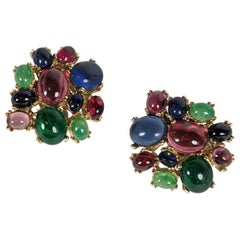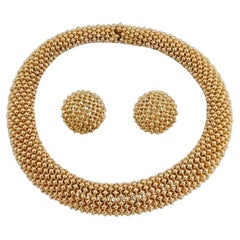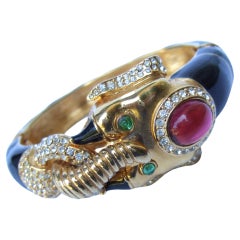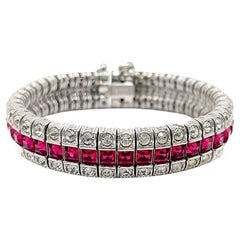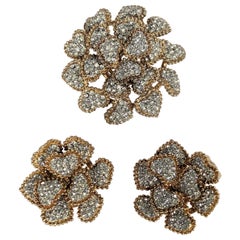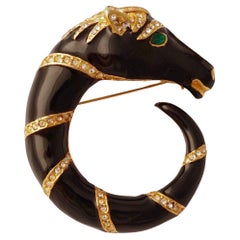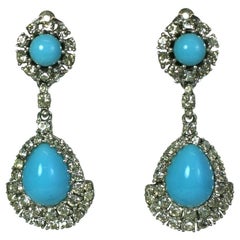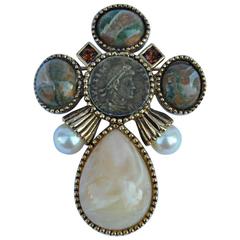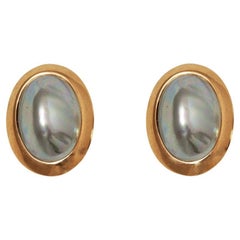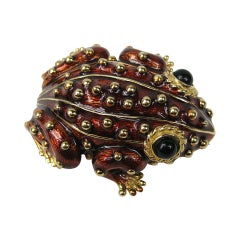Ciner
What defines “fine” jewelry? For many aficionados, there’s a clear line separating the golden wheat from the gilded chaff. But the handcrafted pieces made by Ciner, a 128-year-old costume jewelry house with a glittering past to rival some of the hautest high jewelers, call into question our notions of what constitutes preciousness.
Quality? Craftsmanship? Painstaking detail? Vintage Ciner earrings, brooches, necklaces and other accessories have them all in spades.
Much of the Ciner’s allure can be traced to its origins in fine jewelry. Emanuel Ciner, an Austrian immigrant, founded the firm in Manhattan in 1892, crafting pieces from the traditional precious gems, gold and platinum. But World War I and the Great Depression caused purse strings to tighten and materials to become scarce. Rather than try to weather the economic downturn, which shuttered many other American jewelers, Ciner made the risky transition from fine jewelry to costume (or fashion) jewelry — virtually uncharted territory.
Emanuel Ciner’s sons, Irwin and Charles, introduced an array of innovations — rubber casting molds, which are especially durable and produce higher quality results, and white metal alloys, which affordably mimic the look of more precious materials — that would become the standard for costume jewelry. During World War II, Ciner’s advanced molding technology was utilized by the U.S. military to produce munitions and tools. This arrangement gave the firm access to the heavily rationed metals it needed for its jewels, enabling it again to endure conditions that drove others into bankruptcy.
The company hit its stride in the 1960s, when its jewelry was sold at some of the country’s toniest stores, even garnering an Andy Warhol–illustrated ad for Bonwit Teller. Its pieces were worn by the era’s brightest stars. In the famous 1957 Joe Shere photo of Sophia Loren sneering at Jayne Mansfield’s décolletage, Mansfield is resplendent in shoulder-grazing Ciner earrings.
Ciner is unique among costume jewelers in that its pieces aren’t imitations — they are coveted in their own right. Elizabeth Taylor, a voracious jewelry collector with a taste for the very finest, was a longtime client. Several suites of Ciner jewels were included in the 2011 Christie’s sale of Taylor’s collection, with one group of rhinestone-studded ear clips and a bracelet fetching $15,600 — more than 100 times the auction estimate. It’s a reminder of a time, not so long ago, when women of great style wore fine and costume jewelry with equal aplomb, often at the same time.
Today, Ciner — now run by Emanuel Ciner’s granddaughter Pat Ciner Hill and great-granddaughter Jean Hill — continues to adhere to the same exacting production specifications. It is the only jewelry house in New York, and likely the United States, that manufactures all its pieces entirely in-house. Each begins with dozens of elements that are cast in rubber molds and then individually filed and polished, plated in a particularly thick layer of 18-karat gold or rhodium, assembled on the bench and painted with enamel or set with stones. Every step is performed by hand by craftsmen, many of whom have been with the company for more than 30 years.
Find vintage Ciner clip-on earrings, choker necklaces, bracelets and other jewelry on 1stDibs.
| Average Sold Price |
| $483 |
| Styles |
| Related Creators |
1990s American Artisan Ciner
Gilt Metal
Mid-20th Century American Ciner
Gold
1970s American Retro Vintage Ciner
Gilt Metal
1970s American Modern Vintage Ciner
Enamel, Gilt Metal
1960s Vintage Ciner
1960s American Artisan Vintage Ciner
Gilt Metal
1980s American Modern Vintage Ciner
1960s American Vintage Ciner
Gilt Metal
Popular Searches
Ciner Sale Prices
| Sold Date | Sold Price | Category | Material | Creation Year | |||||||||||||||||||||||||||||||
|
| $483 |
Average sold price of items in the past 12 months |
| $100-$1,050 |
| Sold price range of items in the past 12 months |
Creators Similar to Ciner
Ciner jewelry & watches for sale on 1stDibs.
- Is CINER jewelry real?1 Answer1stDibs ExpertOctober 7, 2024Whether CINER jewelry is real in terms of its materials depends on the piece. Emanuel Ciner, an Austrian immigrant, founded the firm in New York City in 1892, crafting pieces from precious gemstones, gold and platinum. Then World War I and the Great Depression caused people to become more frugal and materials to become scarce. Rather than try to weather the economic downturn, which shuttered many other American jewelers, CINER made the transition from fine jewelry to costume (or fashion) jewelry. As a result, pieces produced in the late 19th or early 20th century may be real in terms of their materials, while those made later typically aren't. On 1stDibs, explore a diverse assortment of CINER jewelry.
- How do I date Ciner jewelry?1 Answer1stDibs ExpertMarch 15, 2024To date Ciner jewelry, examine its details closely. Most pieces from the 1930s were cast in sterling silver, and marcasite was a commonly used material. Jewelry from the 1950s and ’60s will usually have a matte appearance due to the plating process used at that time. Comparing your jewelry to images shared on trusted online resources can help you estimate its age. However, Ciner's hallmarks are rarely helpful, as the maker has used the same logo for years. If you need assistance dating a particular piece, enlist the help of a certified appraiser or knowledgeable dealer. On 1stDibs, shop an assortment of Ciner jewelry.
- 1stDibs ExpertNovember 4, 2024To identify CINER jewelry, search all over the piece for a maker's mark. Virtually all pieces produced by the legendary costume jewelry brand feature the brand name inside a block or on its own beside the letter “R,” which stands for "registered." If you have any lingering doubts about the maker of your piece, a certified appraiser or knowledgeable antique dealer can be of assistance. On 1stDibs, explore a range of CINER jewelry.
- Did CINER use real pearls?1 Answer1stDibs ExpertOctober 15, 2024Yes, CINER did use real pearls to create pieces during the late 19th and early 20th centuries. However, World War I and the Great Depression caused purse strings to tighten and materials to become scarce. Rather than try to weather the economic downturn, which shuttered many other American jewelers, CINER transitioned from fine jewelry to costume jewelry. As a result, later jewelry tends to feature Japanese glass beads instead of genuine pearls. Find a variety of CINER jewelry on 1stDibs.
